How to Start a Digital Marketing Agency in 2026 [10 Steps]
Here's our 10-step process on how to start a digital marketing agency in 2026. In this article, we cover planning, services, pricing, & client acquisition.

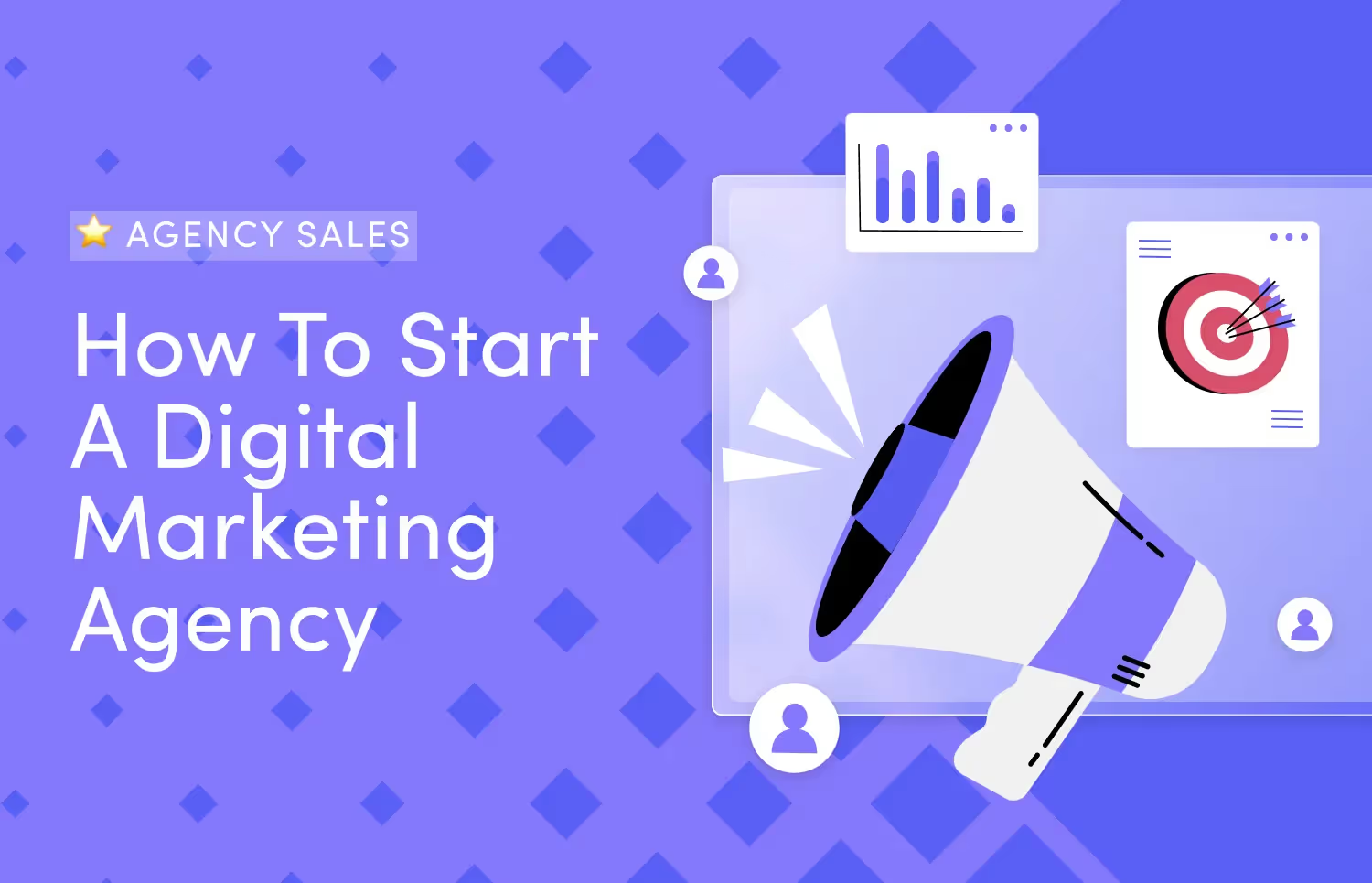


With all the internet gurus peddling the idea of starting a digital marketing agency, you just want to tune out the noise and learn how to (actually) start one.
However, with over 45,000 digital agencies in the U.S. and Canada alone, the market is becoming more crowded.
While the business model is working, reading another generic guide on becoming another generic agency is the least of your priorities. You want a clear road map to help you start a digital marketing agency and differentiate it from the crowd.
And there's no better time to start than now. A recent survey shows most agencies experienced a revenue increase of 25% or more despite economic challenges. In this article, I'll give you the nitty-gritty of starting a digital marketing agency, drawing from the experiences (and wisdom) of people who were once in your shoes and are now enjoying the perks of entrepreneurship.
Key Takeaways:
According to industry reports, digital ad spending is projected to surpass $500 billion in the next few years. That represents a massive opportunity for anyone with the right skills and tools to help businesses navigate these digital waters.
By starting a digital marketing agency, you position yourself to tap into this demand, offering essential services that businesses are willing to invest in to stay relevant and competitive.
Despite what you may hear, it's not too late to start a digital marketing agency. Yes, the market is competitive, and many agencies already exist, but this doesn’t mean there’s no room for new players. Niche specialization, creative offerings, and tailored services are key ways to differentiate yourself.
Clients today are looking for agencies that understand their unique needs and can deliver measurable results. Instead of being daunted by competition, recognize that there’s plenty of space for agencies that bring fresh ideas and focused expertise to the table.
Before starting your digital marketing agency, step back and evaluate whether this is the right path for you. Running an agency can be rewarding, but it’s also one of the toughest entrepreneurial challenges you’ll face.
📌 Pro Tips:
Before launching, you need to understand the demand for your services, identify your competition, and ensure you can offer something valuable that fills a gap in the market.
📌 Pro Tips:
Choosing the right niche and services for your digital marketing agency is one of the most critical decisions you'll make. This will help you define your offerings, attract the right clients, and stand out in a crowded market.
📌 Pro Tips:
Once you’ve decided on your niche and services, it’s time to take care of the legal side of starting a digital marketing agency. This step is crucial for protecting both your business and your clients, ensuring everything runs smoothly from a legal perspective.
The first step in registering your business is deciding on a legal structure that fits your needs. The most common options are:
It’s best to consult with a lawyer or business advisor to determine which structure suits your goals and offers the right level of protection.
After choosing your business structure, officially register your digital marketing agency with the appropriate local or state authorities. This includes:
Having legally binding contracts in place is essential for protecting both you and your clients. Contracts clearly define the scope of work, payment terms, deadlines, and any potential consequences for failure to meet obligations.
A solid contract should include:
📌 Pro Tips:
The right pricing model can attract the right clients, provide you with predictable revenue, and ensure profitability for your agency. Here’s a breakdown of the most common pricing models and how to create service packages that meet diverse client needs.
There are several ways to price your services, and the right model depends on your business goals, client preferences, and the types of services you offer. Here are the most common pricing models used by digital agencies:
To appeal to a variety of clients with different budgets and needs, consider offering tiered packages. These bundles allow clients to choose a package that fits their needs while giving you the flexibility to upsell premium services over time.
📌 Pro Tips:
Running a digital marketing agency involves managing multiple clients, campaigns, and projects—all while keeping track of time, invoices, and deliverables.
This is why investing in the right tools from day one is critical. Streamlining your operations not only saves time but also helps you provide a smoother client experience.
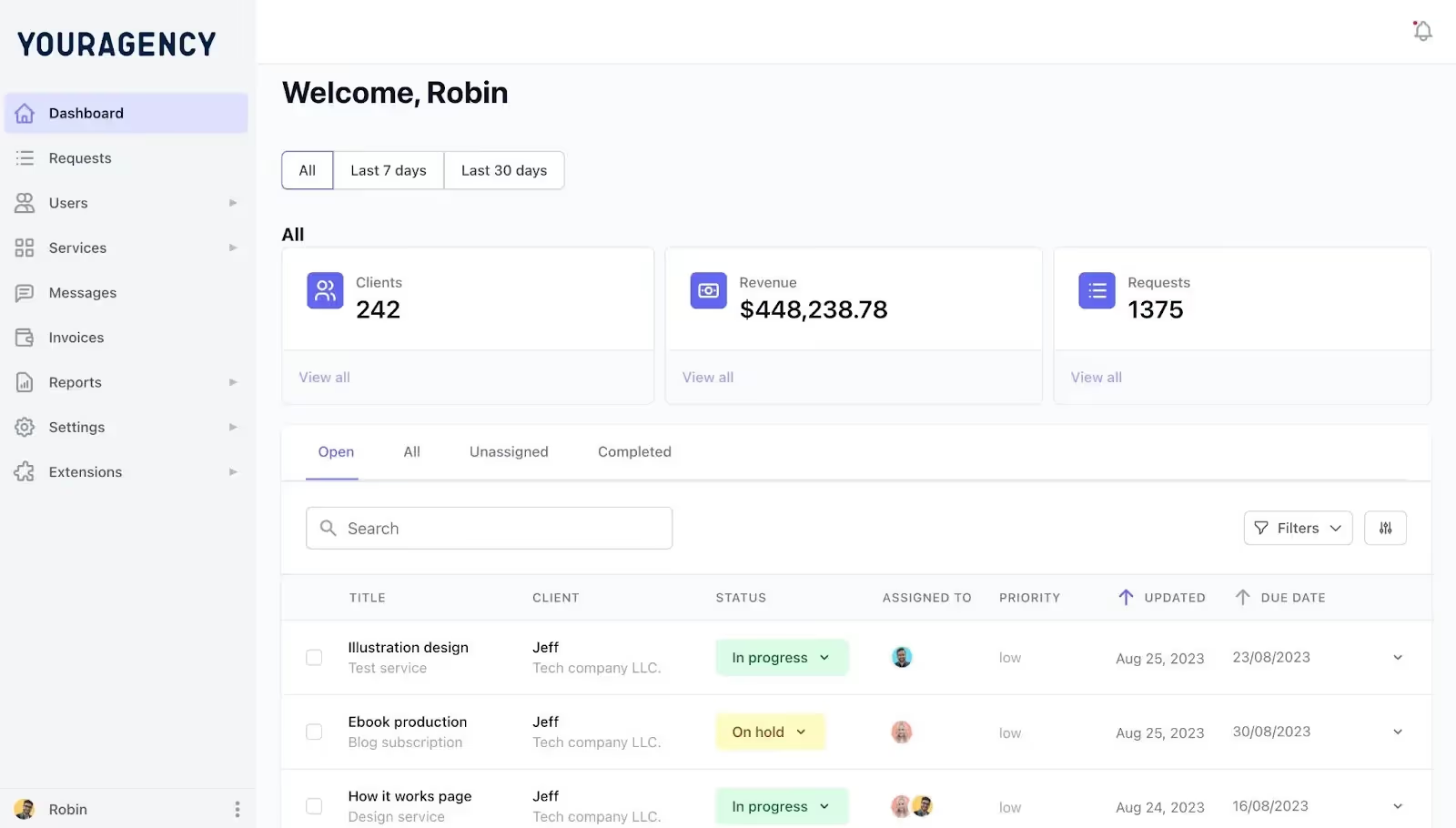
A client portal is an online platform where clients can view project progress, request services, review and approve deliverables, and handle billing–all in the same place.
For new digital marketing agencies, client portals improve transparency, reduce back-and-forth emails, and make it easier to manage ongoing projects.
ManyRequests offers an all-in-one client portal that centralizes everything from project intake, task assignments, and monitoring revisions, to time tracking and invoicing. This single platform simplifies project management, allowing you to focus more on delivering results for your clients and less on managing a web of tools.
DesignGuru, a creative agency that started in 2023, used ManyRequests to manage its growing client base and service a wide range of creative needs, from design to UI/UX and video. By using ManyRequests, they were able to scale rapidly, completing 1,500 projects and achieving double-digit monthly growth.

The ability to centralize task management, communication, and project tracking in one portal helped them stand out and offer a superior client experience. Clients could make design requests, track progress, and even provide feedback directly within the portal. This operational efficiency was key to their success.

If you’re just starting, structuring your services in a simple, easy-to-purchase way can make a huge difference in how you sell to clients.
ManyRequests offers a service builder feature, which helps agencies like DesignBuffs productize their service offerings. This feature allows you to sell both recurring and one-time services through customizable checkout forms or display them in a service catalog that clients can access once logged in.
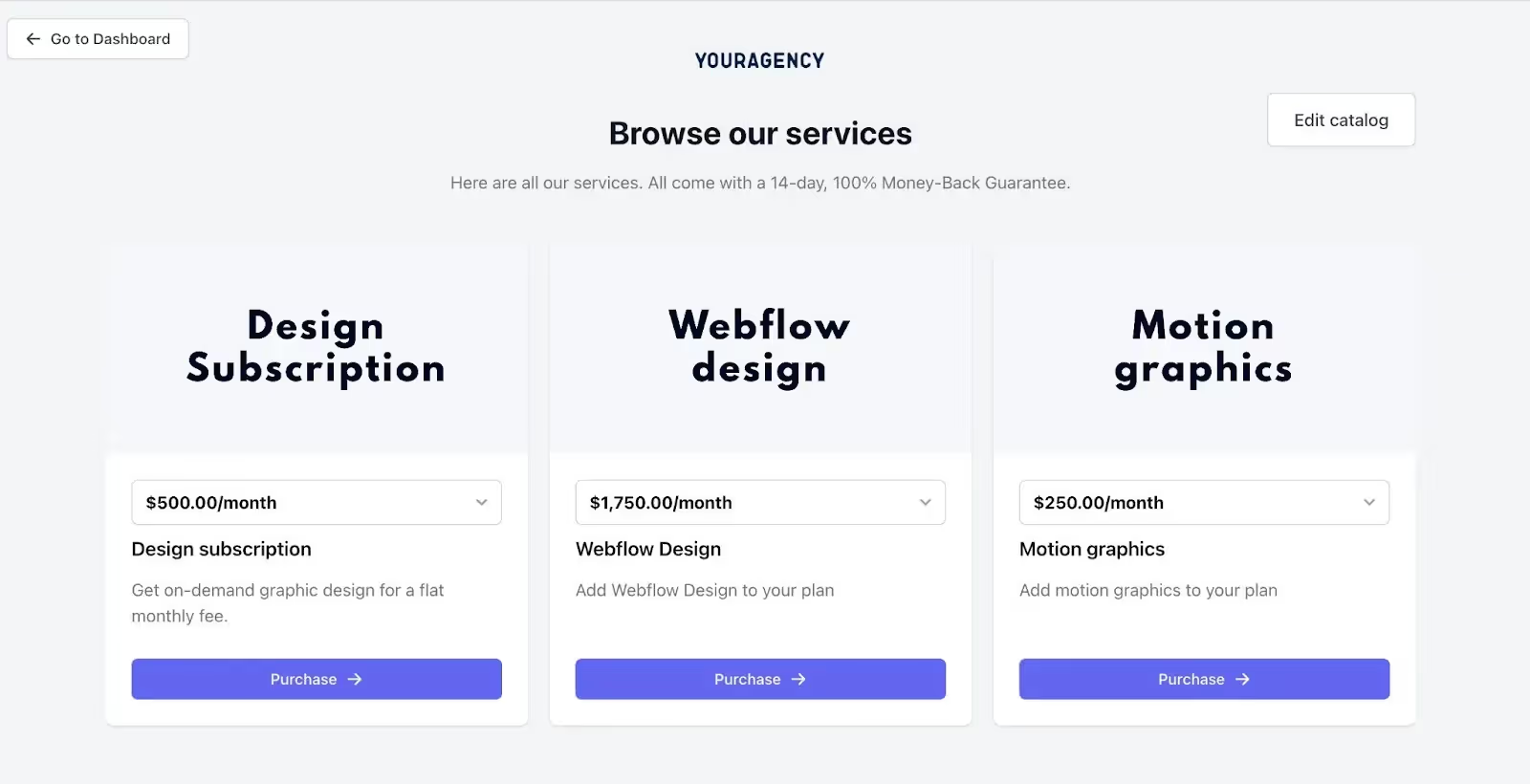
Whether you're offering SEO packages, social media management, or PPC services, clients can easily purchase hourly packs or monthly retainers through the portal and track their usage.
ManyRequests simplifies billing and provides transparency. Clients can log into their portal, see their balance, usage history, and even top-up hours. This functionality aligns well with pricing models such as hourly or retainer-based services, allowing you to create predictable revenue streams while offering flexibility to clients.
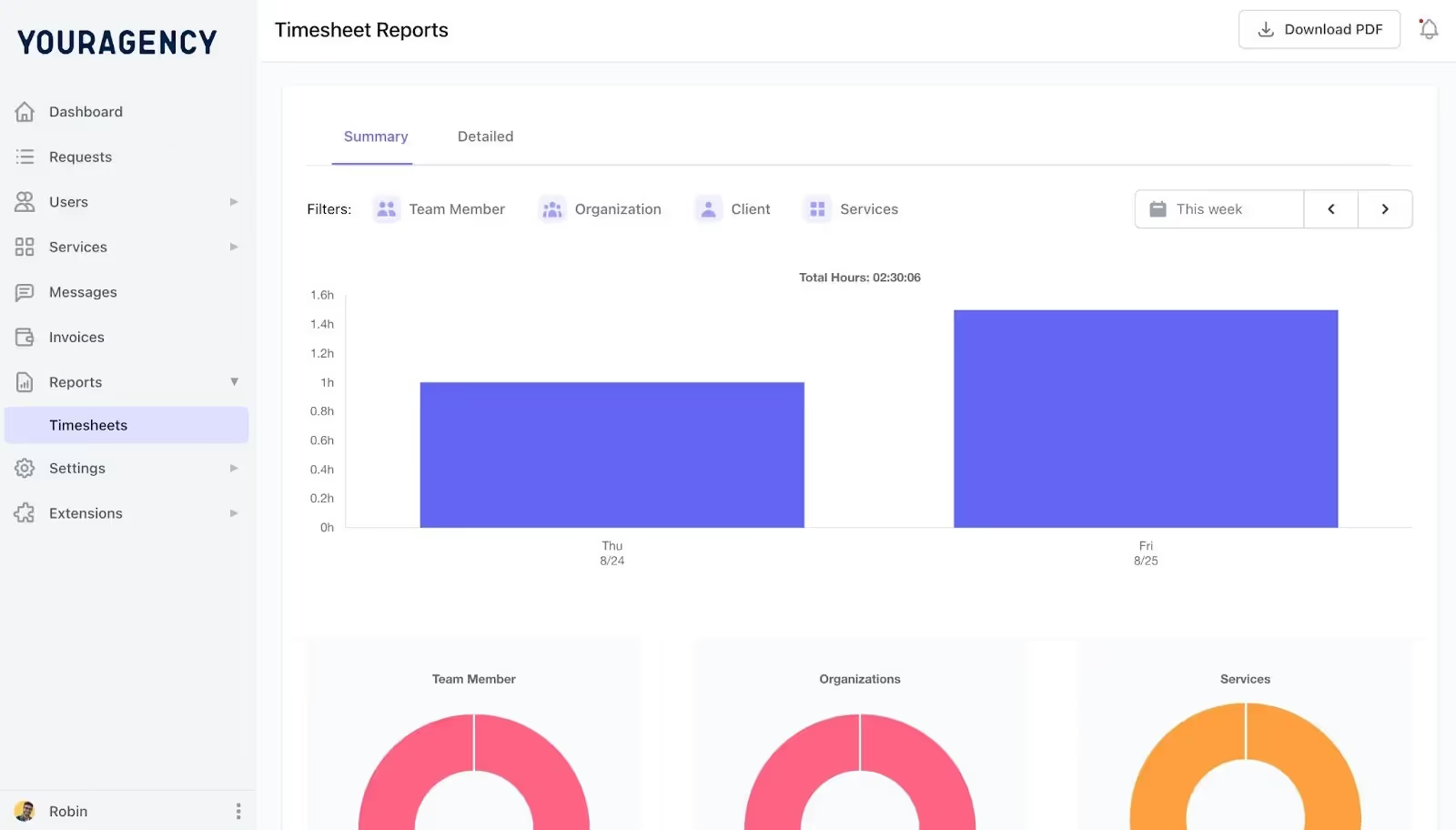
To track the performance of client campaigns, tools like Google Analytics and ManyRequests’ built-in reporting feature provide valuable insights. From campaign performance to designer capacity and customer satisfaction, you can view everything in one place. This not only helps you optimize your team’s workload but also provides your clients with detailed reports, building transparency and trust.
📌 Pro Tips:
Discover how ManyRequests helped new digital marketing agencies boost their revenue by streamlining their workflow. Or you can sign up for a free trial today to see how it works.
Acquiring your first clients is often the biggest hurdle for new digital marketing agencies. And it will continue to be a challenge for as long as your business exists.
The 2024 Benchmarks Reports, which surveyed 251 marketing agency leaders, reveal that acquiring new clients remains the most significant challenge for marketing agencies.
Many experienced agency owners stress the importance of taking proactive steps to network, build relationships, and offer value upfront to gain trust. Here’s how you can start building your client base:
One of the most effective ways to find clients is by building relationships. Start by joining online communities where your potential clients spend time, such as industry-specific Facebook Groups, LinkedIn, Reddit, or local business events.
Engage in discussions, offer advice, and provide insights without immediately trying to sell your services. You can also attend local business meetups or networking events where small business owners are likely to be looking for marketing assistance.
As you build a reputation as a helpful resource, businesses will start reaching out to you for help.
Many successful agencies, like Digital Butter, began their journey by doing a lot of pro bono work to build a portfolio. They focused on generosity and relationship-building, which led to strong client referrals. This foundation helped them grow their agency through word-of-mouth.
In the early stages, offering free consultations, initial audits, or discounted rates can help you attract your first clients. This approach allows potential clients to see the value you bring before committing to a contract.
For example, you could offer a free SEO audit or a PPC campaign review. This demonstrates your expertise and helps build trust, making clients more likely to hire you for ongoing work. Once you have a few case studies and positive testimonials, it becomes easier to pitch to other businesses.
Word-of-mouth is one of the most powerful tools for growing your client base. Don’t hesitate to reach out to your network for referrals or ask your satisfied clients for recommendations.
Building strong relationships with your initial clients can lead to repeat business and new client opportunities. Encourage your clients to spread the word about your services and ask for testimonials to build your credibility.
Remember, referrals often come from delivering great work, so focus on building trust and providing top-notch service.
Not all clients are created equal. It’s important to define your ideal client from the start. Look for businesses that understand the value of digital marketing and are looking for a long-term partnership rather than short-term fixes.
Avoid clients who want to micromanage or undervalue your expertise. Working with the wrong clients can lead to stress, missed deadlines, and ultimately burnout.
📌 Pro Tips:
Looking for more ideas? Check out this guide: How To Get New Agency Clients? Here Are 21 Unique Ways
Once you’ve secured your first clients, creating a smooth onboarding process is essential for setting the tone of your working relationship. A well-organized onboarding system ensures you gather all the necessary information upfront, set clear expectations, and streamline communication—helping you deliver results from the start.
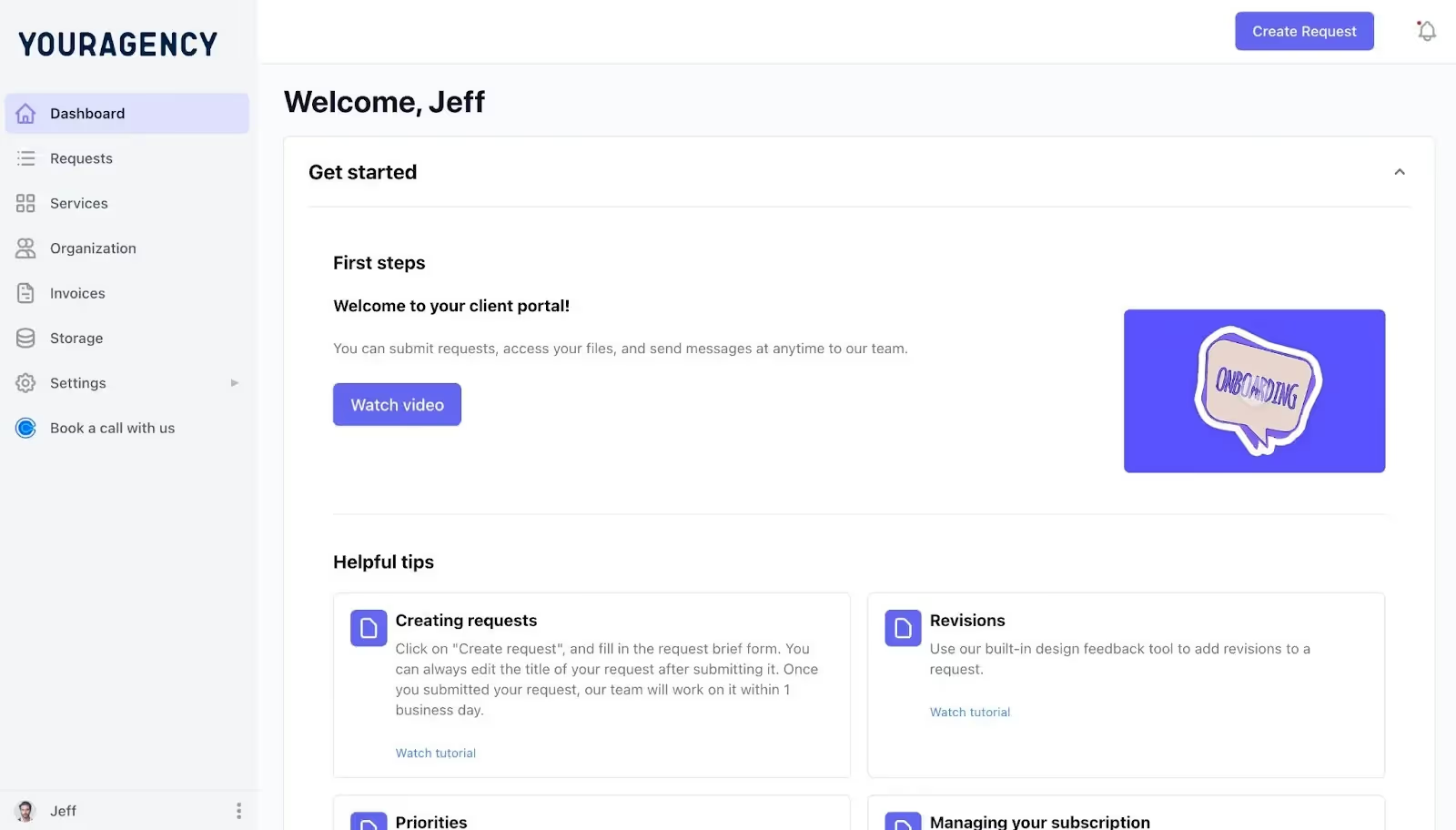
Establishing a clear and efficient onboarding process can make or break the start of a project.
This is where tools like ManyRequests become invaluable. ManyRequests simplifies the onboarding process by automating tasks such as sending contracts, managing communications, and organizing project workflows—all in one place. This eliminates the need to use multiple tools and reduces the risk of errors or miscommunication.
If you’ve already built a client base, ManyRequests also offers a hands-on, white-glove onboarding service. This includes a complimentary migration process, which typically takes less than a week. ManyRequests’ team of experts assists with moving all existing requests, messages, and client assets into the new portal. This allows agencies to test out the portal before rolling it out to their client base, ensuring a seamless transition.
Prontto, a 3D digital visualization platform, successfully used ManyRequests to onboard their clients, submit project briefs, and ensure projects were assigned to the correct architects. Clients were able to track revisions, access their files, and communicate with the team—all within the portal.
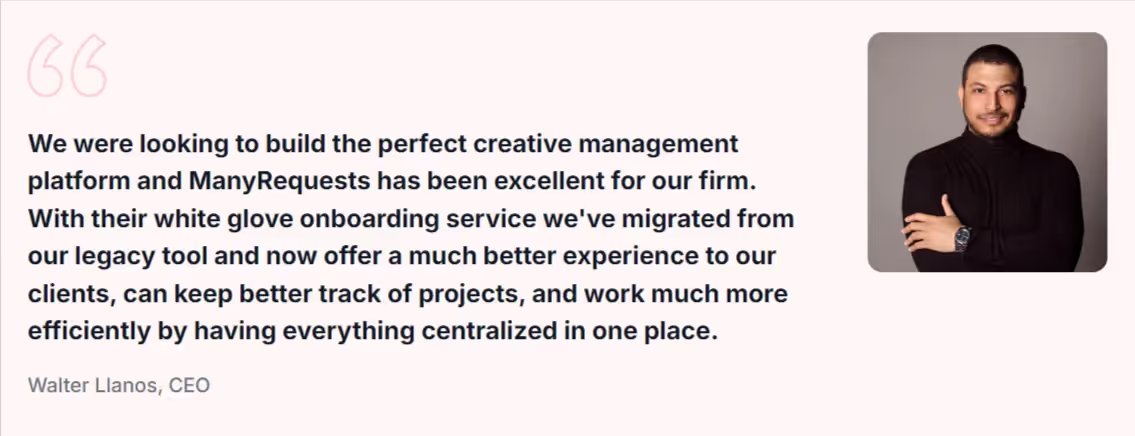
With ManyRequests, you can also automate important steps, such as project auto-assignments and setting up conditional rules for project briefs. This allows you to focus on delivering high-quality results rather than manually managing client requests.
Interested in a seamless onboarding experience tailored to your agency’s needs? Book a call with us today to learn more.
Establishing a strong brand and online presence helps create a consistent flow of clients to your business. Your brand identity and website will serve as the first impression for potential clients, so it’s important to create one that reflects your services and resonates with your target market.
Your brand name, logo, and visual identity should reflect your agency’s niche and target audience. Choose a brand name that is simple, memorable, and aligns with the services you offer. If your agency focuses on a specific industry (e.g., SEO for real estate), incorporate elements that connect with that niche.
Invest time in designing a professional logo and defining your brand colors, fonts, and overall style. These visual elements should be consistent across all platforms—website, social media, and marketing materials.
A well-designed website is your agency’s virtual business card designed for showcasing your services, providing testimonials, and generating leads. Keep it simple but professional. At a minimum, your website should include:
📌 Pro Tips:
There’s no shortcut to building a thriving agency—you have to consistently provide value that sets you apart from the competition. Your ability to solve problems, drive measurable outcomes, and maintain the highest quality standards will be the key to long-term success.
Whether you specialize in SEO, PPC, content marketing, or social media management, your clients need to see you as the go-to authority. If you don’t deliver, another agency will step in, audit your work, and win over your clients.
Michael Borgelt, founder of 51Blocks and BionicWP, built his agency on this principle. By focusing on quality digital marketing services and strong customer relationships, his agency has achieved a customer lifetime value of over 2.5 years and generates $2.6 million in annual revenue.
Just like how Amazon’s success is built on offering unmatched convenience, your agency’s growth will be driven by consistently delivering results that exceed expectations. If you can offer your clients more value, better results, or faster service than your competitors, they’ll stay loyal to you.
Case in point: Hey Digital, a leading SaaS marketing agency, needed a streamlined process to manage their ad design subscription service. With ManyRequests, they were able to offer a seamless experience for clients requesting ad creatives, improving delivery speed and operational efficiency.
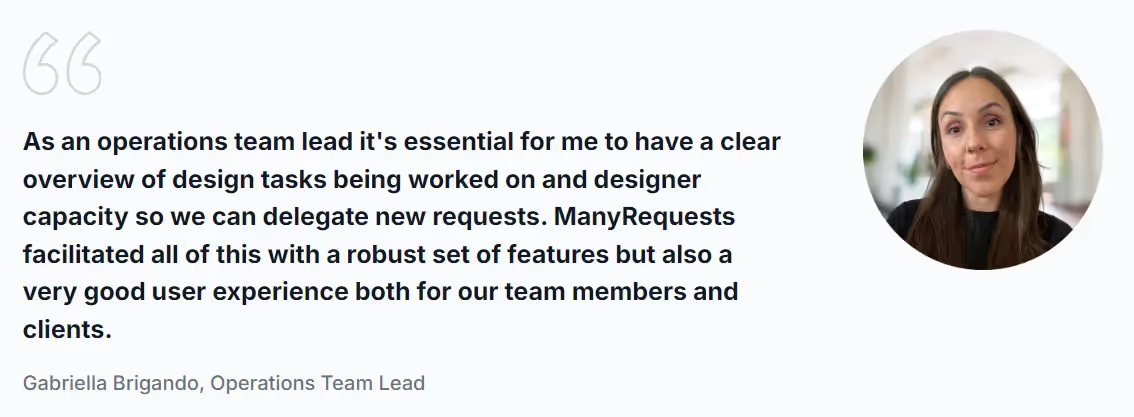
Hey Digital used ManyRequests to:
With everything in one place, Hey Digital’s team of project managers can monitor progress, ensure timely delivery, and manage client expectations more efficiently. This level of operational excellence ensures that they consistently deliver top-quality work, helping them build long-term relationships with clients.
📌 Pro Tips:
Starting a digital marketing agency with no experience can be challenging but not impossible. Begin by learning essential digital marketing skills through online courses, certifications, or hands-on practice. Consider offering free or discounted services to small businesses in exchange for testimonials and case studies.
Once you’ve built a portfolio, develop a clear digital marketing agency business model that outlines your niche, services, and pricing structure. Focus on networking, building relationships, and refining your skills with every project.
The best digital marketing agency business model depends on your goals and services. Common models include hourly billing, project-based pricing, retainers, and performance-based pricing. Many agencies prefer retainer models for long-term stability, while performance-based models tie compensation to results. Choose a model that aligns with your services and the value you provide.
The cost to start a digital marketing agency varies but can be relatively low compared to other businesses. Initial expenses may include a website, software tools for marketing and project management, and business registration. You can start lean by using free or affordable tools, focusing on networking for client acquisition, and scaling operations as you grow.
The most profitable services for a digital marketing agency typically include SEO, PPC (Pay-Per-Click), social media marketing, and content marketing. Offering specialized services like conversion rate optimization (CRO) or eCommerce-focused marketing can also drive high profitability.
When structuring your digital marketing agency business model, consider bundling services into packages to increase client retention and monthly revenue. Managing multiple services efficiently can be achieved using tools like ManyRequests, which centralize project management and client communications.
Finding clients for your digital marketing agency starts with networking and offering value upfront. Join relevant online communities, attend local business events, and leverage platforms like LinkedIn to connect with potential clients. Offering free consultations or audits can help you showcase your expertise and build trust. Once you’ve delivered results, ask for referrals and create detailed case studies to attract more clients.
Building a successful digital marketing agency goes beyond delivering great work. It requires smart decisions on pricing, creating a standout brand, and fostering long-term client relationships. But as your agency grows, managing client communications and expectations can become a challenge.
That’s where ManyRequests can make all the difference. By consolidating client onboarding, project tracking, and communication into one platform, ManyRequests helps you streamline your operations and stay focused on delivering results. No more juggling tools—just efficient, organized management that keeps both you and your clients aligned.
Take the next step in scaling your agency. Try ManyRequests free for 14 days and see how it can simplify your workflow and enhance client satisfaction.